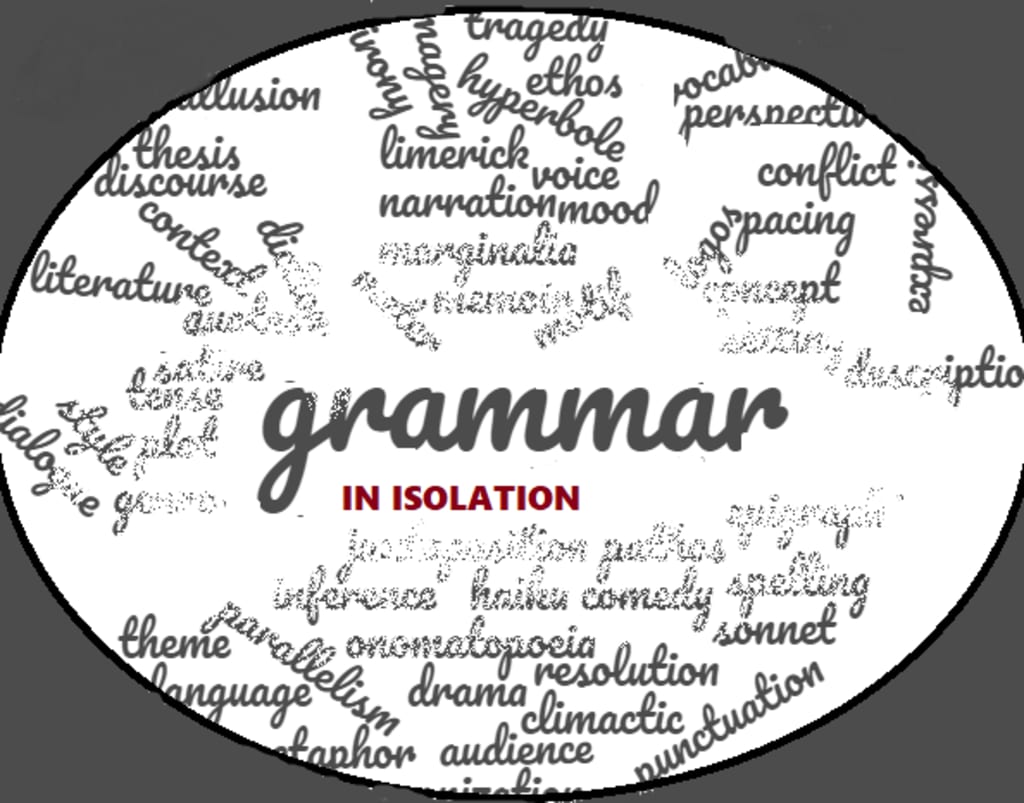Grammar In Isolation
University Theory vs. Classroom Experience

The prevailing theory in the modern university classroom, as developed by education bigwigs and based upon their unequivocal research, is that teachers must never give their classes lessons on grammar isolated from other aspects of text. The reasons why sound very compelling to a young teacher or teacher-candidate. The student is easily bored and therefore apt to immediately forget whatever was taught, especially when returning to the realm of available modern technology, where a blind trust in the authority of spell-checkers enables adolescents (and too many adults also) to tolerably get by in the world without looking too much the fools. Education gurus therefore assert that we address grammar as a secondary tier upon methods and concepts that are more likely to hold the students' attention because of their deeper involvement with the text. Perhaps while examining an author's point-of-view (first or third-person) we should look for subject-verb agreement. Perhaps in a wider discourse on description we should find a teachable moment in which to caution against the comma-splice.
It sounds very fine on paper, doesn't it? But my own experience with middle-of-the-road high-school students is that this practice invites confusion for the students and abdication for the teachers. These teachers check off the grammar box on their list of obligations and never test the material, never mark down papers for grammatical errors, and allow their students to continue merrily along without ever even knowing what a complete sentence looks like. The well-intentioned teachers assume that something so universal will ultimately catch up with them in practice, or else they place that same blind trust in spell-checkers that their students have become so reliant on.
But spell-checkers don't work on handwritten notes or off-the-cuff speeches. As well-intentioned as these teachers are, they are enabling these students to look uneducated at some point in the future. How little the graduates will care about being able to identify point-of-view or effective description when they are unable to communicate the simplest of ideas in a comprehensible manner when put on the spot to do so. This kind of real-world know-how is supposed to be the first priority of the education system, and yet it has been all but drummed out of the modern classroom. Many teachers themselves are not confident with grammar, continuing a cycle of ignorance. Even if there is no loss of clarity in meaning (though I would contend there invariably is), there is a loss of polish and refinement that does not merit the confidence of readers and listeners.
I was raised, in my university education, with this bigwig claptrap that grammar must never be taught in isolation, and I was amazed when the experienced and well-regarded mentor teacher I was placed with did just this. I was amazed even more by how the students responded to those lessons, those "Grammar Mondays" where the entire hour was devoted to understanding a particular part of grammar.
English teachers, and I am no exception, love content to a fault. We adore the deep and meaningful parts of literature. We bask in the metaphor and the subtext, and this makes it easy for us to neglect the dryness of grammar (and this may be true of students only when they are already good readers). But I was amazed to find that the average student, who has never read a novel from cover to cover in his or her life, appreciates the return from that task of mining for deep truth in a text that is the bookworm's labor of love. What I observed in the classroom is that many students would prefer to work on a grammar sheet that is cut-and-dry, identifying adjectives and adverbs, and being told explicitly "this is wrong," rather than "perhaps you could read it that way." For many students, this math-like quality makes a deal more sense to their world, in which they've never been required to deeply sacrifice or take a difficult stance or contemplate the beauty that shines through tragedy.
Some English teachers believe that this is their only duty: to get their students to be deeper thinkers. I would agree that this is a duty, but not the only duty, and not even the primary duty. The primary duty should be to prepare students for real life after high-school. Necessities should include proper email etiquette, legible handwriting, style depending on the audience, resume-building, and perhaps even some more archaic needs such as how to address an envelope for the mail. In all of these things, clarity is desperately needed, and this clarity can only be achieved with a basic knowledge of proper grammar. Anyone can be forgiven a misplaced comma (especially because the use of the comma has been inconsistent through time), but graduates who are well-educated in clarity of communication will stand head-and-shoulders above their peers in the job market. The road to perfect grammar is a never-ending one, and so I would not suggest that English teachers make grammar their exclusive study. However, I do think we should serve the students with the drudgery of grammar before indulging our love of content. To make metaphorical language or analyzing themes a reward after slogging through grammar might even serve to enhance the students' love for these more literary elements.
About the Creator
Joel Crow
My life in a literature timeline: Goosebumps - The Hobbit - The Lord of the Rings - Charles Dickens Novels - Les Miserables - Agatha Christie Mysteries - C.S. Lewis - Asimov's Foundation Series - Historical Nonfiction and Politics
Enjoyed the story? Support the Creator.
Subscribe for free to receive all their stories in your feed. You could also pledge your support or give them a one-off tip, letting them know you appreciate their work.






Comments
There are no comments for this story
Be the first to respond and start the conversation.